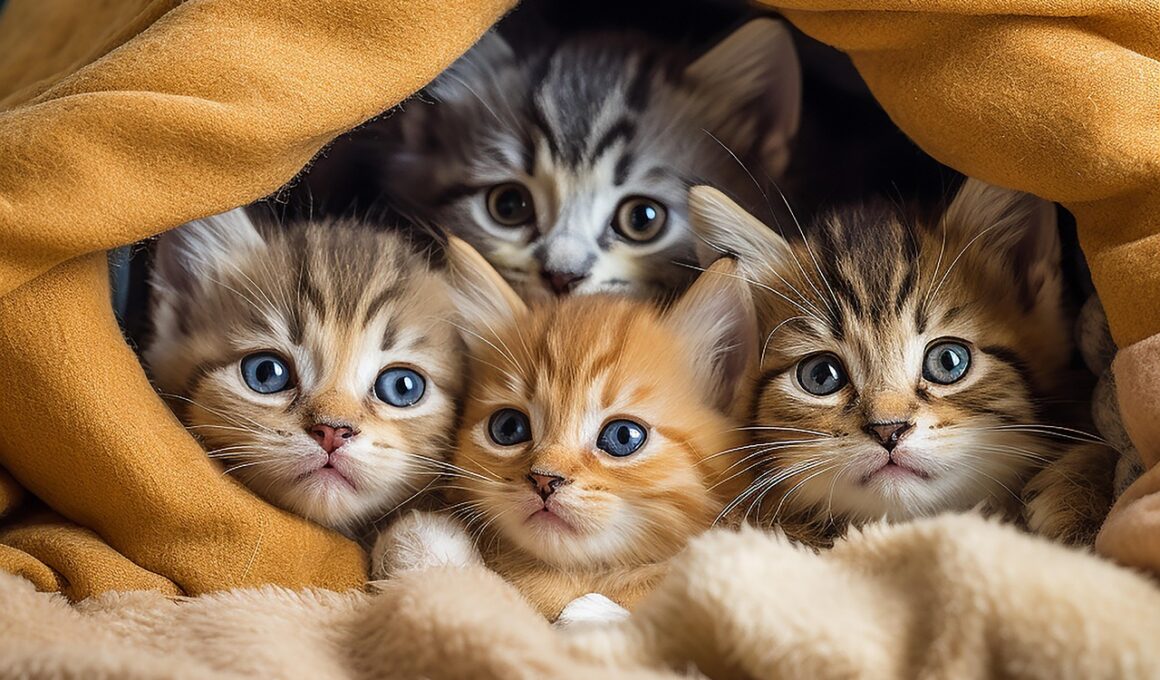How to Build Confidence in Your Kitten Through Socializing
Socializing your kitten is essential for their overall well-being and development. By introducing them to various environments, people, and other pets, you will build their confidence and reduce anxiety as they grow. Start socialization as early as possible, ideally when they are between three to nine weeks old. This early exposure helps in forming positive associations with new experiences. Include gentle handling, short car trips, and visits to homes where other pets live. Allow them to explore around the house, while ensuring the area is safe and free from hazards. Create a consistent routine that includes time spent with different members of the family. This can show them that humans are not just there for feeding but also for playtime and affection. When introducing your kitten to new individuals or animals, proceed slowly and allow them to approach at their own pace. Provide plenty of positive reinforcement through treats and praise. This way, your kitten will learn that new encounters lead to enjoyable experiences, fostering confidence and curiosity.
Benefits of Early Socialization
Early socialization plays a crucial role in shaping your kitten’s temperament and behavior throughout their life. Kittens that experience a broad range of social situations tend to become more adaptable, friendly, and confident. They are less likely to develop behavioral issues such as aggression or fearfulness, especially towards strangers or other pets. It’s also vital for their future interactions with other animals and their environment. A well-socialized kitten is more likely to be calm and comfortable during veterinary visits, grooming sessions, or when introduced to unfamiliar situations. Additionally, exposing them to different sounds, sights, and smells can help them develop resilience against anxiety and stress in adulthood. Incorporate activities such as gently exposing them to household noises like vacuum cleaners or doorbells while providing comfort. You can also host small gatherings for friends to meet your kitten and allow them to become accustomed to various voices and movements. Creating positive experiences during these encounters lays a solid foundation for emotional stability and well-rounded personality traits as they grow into adulthood.
Another important aspect of socialization involves interaction with other pets. If you have other animals, introduce them gradually to your kitten. Supervise their introductions to ensure these meetings are positive and stress-free. Your other pets can serve as excellent role models for your new kitten, exhibiting social behavior that they can mimic. When introducing them, keep the other pets restrained initially to avoid overwhelming your kitten. Allow sniffing and gradual interaction at their own pace. Consider rewarding your existing pets for calm behavior around the new kitten, reinforcing a sense of safety. If available, arrange playdates with other friendly, vaccinated kittens. These encounters can teach your kitten crucial social skills, such as proper play behavior and body language. Observing how other kittens interact can help build their confidence and encourage healthy socialization patterns. It’s essential to monitor all interactions closely, stepping in if there is any sign of aggression or fear. The goal is to create a positive environment that ensures your kitten develops into a well-adjusted, communicative adult cat.
The environment in which you socialize your kitten is also significant. Begin socializing them in a safe and familiar setting before gradually moving to more stimulating environments. Keep in mind that each new experience should be associated with comfort and positivity. Consider arranging a visit to a friend’s house, where they can explore while being closely monitored. You could also create a designated play area in your home filled with different toys and textures to encourage exploration. Familiar scents are reassuring, while new items should be introduced one at a time. Include interactive toys that engage their attention and promote physical activity. Ensure that their play space gives opportunities for climbing, hiding, and scratching, as these are natural feline behaviors that can contribute to a confident disposition. As they explore, reward them with treats or affection, reinforcing their brave behavior. Always observe your kitten for signs of anxiety, such as hiding or hissing, and take a step back if necessary. Patience is vital during this process, allowing your kitten to build confidence at their own pace within a nurturing environment.
Understanding Your Kitten’s Body Language
To socialize your kitten effectively, it’s essential to understand their body language cues. Kittens communicate through their posture, tail position, ear orientation, and facial expression, making it easier for you to assess their comfort levels. Observe behaviors such as tail flicking or ears flattened against their head, which may indicate stress or hesitation. Offering them extra space during encounters may help them feel secure. On the contrary, a kitten with an upright tail, relaxed ears, and an inquisitive demeanor demonstrates curiosity and readiness to engage. Recognizing these signals can dramatically enhance your approach to socialization and help you adjust your techniques accordingly. Always aim to reinforce positive experiences while avoiding those that could lead to fear. Allow your kitten to retreat to a safe space if they feel overwhelmed, ensuring they understand they can control their environment. This reinforces their confidence and agency, making future encounters less intimidating. Remember, every kitten is distinct, so take time to study their cues and evolve your approach based on their unique personality and reactions during social interactions. Patience and observation go a long way in successful kitten socialization.
Engage your kitten in structured play sessions to develop their confidence further. Fun activities help them socialize and stimulate their minds, promoting a healthy bond as they grow. Use interactive toys, such as feather wands, laser pointers, or small balls, to encourage them to chase and pounce, mimicking natural hunting behaviors. Regular play sessions also allow them to expend energy, preventing behavioral issues stemming from boredom or excess energy. Create a routine for structured play throughout the day to help your kitten anticipate interactions and develop trust in you as a play partner. Incorporating family members in these sessions can strengthen your kitten’s bond with everyone, creating a supportive environment for social skill development. When they bravely engage in play, offer praise and treats, reinforcing positive behaviors that boost their confidence. Remember to give them breaks to avoid overstimulation; short sessions are often more effective than prolonged ones. Whether you’re using toys or engaging in gentle wrestling, make sure you foster an atmosphere of safety and enjoyment. This will make your kitten eager to explore social interactions beyond playtime, helping them grow into a well-adjusted adult cat.
Gradually Increasing Exposure
As your kitten becomes more comfortable with various social settings, gradually increase their exposure to new experiences. Introduce them to different types of environments, such as your neighborhood or local parks, where they can meet new people and hear various sounds. Each outing should be tailored to their comfort level, starting with shorter visits and expanding as they gain confidence. The key is to make these outings fun and rewarding rather than overwhelming. During walks, consider using a secure harness to give them the freedom to explore while ensuring their safety. If your kitten seems nervous, allow them to stay closer to you, providing reassurance through gentle strokes or calming sounds. Schedule outings around their playful and active times, maximizing engagement with their surroundings. Set up positive experiences by bringing along treats or toys to reinforce adventurous behavior. With time, your kitten will learn that diverse environments and new encounters lead to enjoyable experiences. Be patient as some kittens may take longer to adapt, so always respect their limits and individual temperament during these excursions.
Finally, remember that each kitten is unique, and their socialization journey may vary. Pay attention to their personality traits and tailor your approach accordingly. While some kittens may thrive in busy settings, others may require a more gradual approach to building confidence. Consistency is essential in reinforcing positive experiences, so create routine socialization sessions. Always try to end each encounter on a positive note, allowing them to feel accomplished and secure. Use gentle encouragement rather than force in introducing new situations, personalities, or environments to ensure your kitten feels safe. Above all, celebrate their progress no matter how small, building a positive association with socializing. Keeping your kitten stress-free during these sessions will foster their overall well-being. As they build their confidence through proper socialization, you will develop a deep bond with your furry friend. Be patient and enjoy the rewards of working to nurture a confident, outgoing kitten that transitions smoothly into a loving, social adult cat. This journey is incredibly rewarding as you witness growth into an emotionally stable and social feline companion.


